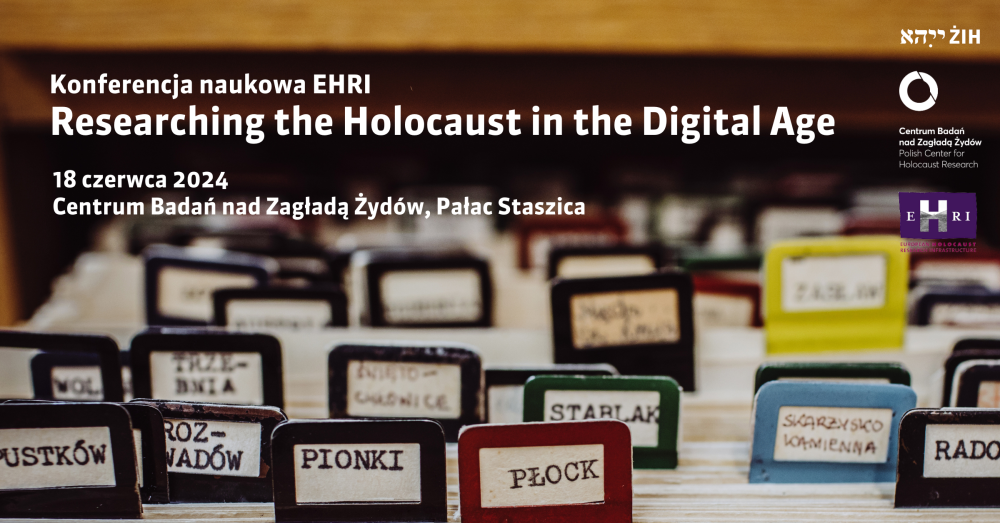Menu
- Aktualności
- Wydarzenia
- Oneg Szabat
- Zbiory
- Nauka
- Wystawy
- Edukacja
- Wydawnictwo
- Genealogia
- O Instytucie
- Księgarnia na Tłomackiem
- Czasopismo „Tłomackie 3/5"
- Kwartalnik Historii Żydów

.png)
Formularz rejestracyjny dla gości
Konferencja będzie transmitowana na żywo na YouTubie i Facebooku.
PROGRAM
09:15 – 10:00 Kawa i rejestracja
10:00 – 10:05 Przywitanie
10:05 – 10:20 The European Holocaust Research Infrastructure (EHRI)
10:20 – 12:00 Exploring the Use of Digital Techniques in Holocaust Research (I)
10:20 – 10:40 Interacting with Restless Archive: Sustainability and Archival Aggregation in Long-Form Digital Storytelling Platforms
Simone Gigliotti, Royal Holloway, University of London, UK
10:40 – 11:00 Unveiling Patterns: Exploring Socio-Demographic Characteristics as Predictive Factors for Deportation of Jews Registered in Bruxelles in 1940, Using Binary Logistic Regression
Adina Babeş-Fruchter, KU Leuven, Belgium
11:00 – 11:20 Natural Language Processing Meets Holocaust Research
Martin Wynne, University of Oxford and Isuri Anadhuri, University of Wolverhampton, UK
11:20 – 12:00 Digital Heritage Related to Nazi Persecution: Reactualisation of Collective Memory of the Holocaust through a Virtual Interactive Exploration Platform
Aliisa Ramark and Hector Lopez-Carral, Radboud University Nijmegen, The Netherlands
11:40 – 12:00 Dyskusja
12:00 – 13:30 Lunch i pokaz plakatów*
13:30 – 15:00 Exploring the Use of Digital Techniques in Holocaust Research (II)
13:30 – 13:50 Integrating Citizen Science in the Digital Age as a Sustainable Innovation in Holocaust Research: Participatory Research, Presentation and Transformation
Inka Engel, University of Koblenz, Germany
13:50 – 14:10 Digital Humanities and Multiscalar Approaches to the Holocaust: The Case of the Brest-Litovsk Ghetto
Boris Czerny, Université de Caen-Normandie, France
14:10 – 14:30 Mass Grave Investigations of Holocaust Victims in the Digital Age: Strategies for Searching in Ukraine
Daria Cherkaska, Staffordshire University, UK
14:30 – 14:50 Memory Wars and Digitized Denialism: The Rehabilitation of a Romanian War Criminal
Adina Marincea, "Elie Wiesel National" Institute for Studying the Holocaust in Romania, Romania
14:50 – 15.10 Dyskusja
15:10 – 15:40 Przerwa kawowa
15:40 – 17:20 New Digital Research Methods and Innovations
15:40 – 16:00 Reference and Information Services in Yad Vashem Archives – Opportunities and Challenges of the Digital Era
Yael Robinson Gottfeld, Yad Vashem, Israel
16:00 – 16:20 Cartographic Representation of the Krakow Ghetto: A Distorted Image of Tragedy
Stanislaw Szombara, AGH University of Science and Technology and Alicja Jarkowska, AGH University of Krakow, Poland
16:20 – 16:40 Streamlining the Creation of Holocaust-related Digital Editions with Automatic Tools
Floriane Chiffoleau and Sarah Beniere, INRIA, France
16:40 – 17:00 Querying the Archive: Relational Database Design and the Study of Holocaust-Era Materials
Emily Klein, US Holocaust Museum Memorial, USA
17:00 – 17:20 Dyskusja
17:20 – 17:30 Uwagi końcowe
17:30 – 18:00 Napoje
18:00 – 20:00 Kolacja
* Pokaz plakatów:
What Are Good Examples of the Opportunities for Holocaust Research in the Digital Age? The Example of Visual History Archives – Alessandro Matta, Sardinian Shoah Memorial Association, Italy
"The Sunflower": Narrating the History of Wiesenthal's Book Through a Digital Online Edition – EHRI-Team (VWI), Vienna Wiesenthal Institute for Holocaust Studies, Austria
Knowledge Modelling with Holocaust Testimonies – Isuri Anuradha, University of Wolverhampton
EHRI-NER: Multilingual Named Entity Recognition Resources for Holocaust-Related Texts – Maria Dermentzi, King’s College London, UK, and Hugo Scheithauer, Inria, France
Project "Evaluating and Publishing Files on Compensation Cases" (https://kittl.arbeiterarchiv.de) – Steffen Müller, Germany
Lost Lift Database – Jacqueline Malchow, German Maritime Museum, Germany
The Lagnuage of Emotions in a Digital Project about the Holocaust – Pawel Rams and Agnieszka Zalotynska, Polish Academy of Sciences, Poland
_____
Konferencja jest organizowana przez Żydowski Instytut Historyczny im. Emanuela Ringelbluma i Centrum Badań nad Zagładą Żydów w ramach Projektu EHRI.